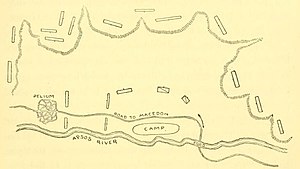| Siege of Pelium | |||||||
|---|---|---|---|---|---|---|---|
| Part of Alexander's Balkan campaign | |||||||
 The Plain of Pelium | |||||||
| |||||||
| Belligerents | |||||||
| Macedon | Illyrians | ||||||
| Commanders and leaders | |||||||
|
Alexander the Great Hephaestion |
Cleitus Glaukias | ||||||
| Strength | |||||||
|
23,000 total
| 7,000 | ||||||
| Casualties and losses | |||||||
| 2,000 | 5,000 | ||||||
| Alexander's first attempt to siege Pelion failed and the Macedonians were forced by Illyrians to retreat on the other side of the river, which thus far could have been interpreted as a sort of Illyrian victory. But after three days Alexander undertook a night attack defeating by surprise the defenseless Illyrians. Without support from the outside, Cleitus and his Illyrians burned the stronghold and fled to Glaukias' realm.[1] | |||||||
The siege of Pelium was undertaken by Alexander the Great against the Illyrian tribes in parts of what is modern-day Albania. It was critical for Alexander to take this pass as it provided easy access to Illyria and Macedonia, which was urgently needed in order to quell the unrest in Greece at this time in Athens and Thebes. This was an important point of demarcation in Alexander's early reign, as it established him among the Danubian tribes to the north as a serious monarch to be reckoned with, just as he would later establish this precedent for the Greek city states under his hegemony. Taking this pass allowed Alexander to march his army to southern Greece quickly, which would eventually result in the total destruction of Thebes.
- ^ a b Vujčić 2021, pp. 524–525.